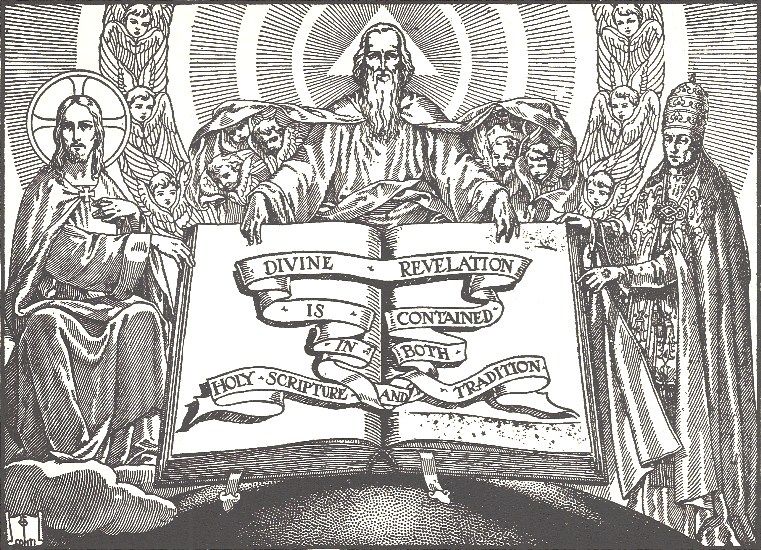Anyone who has had some exposure to Shakespeare, or who invests gobs of time viewing and sharing memes on social media (yes, I’ve been guilty of this too), is probably familiar with the phrase, “To be or not to be? That is the question.” And though this phrase, or variation of it, has already been exhaustively over-used in modern times, the first thought to jump into my mind for this video’s topic was “To Sola Scriptura or not Sola Scriptura?”
And despite that question being a cliché, lackluster opener to this blog, it is very much a question we Christians need to answer. After all, this core question has kept Protestant denominations separated from the Catholic Church for about 500 years now.
In fact, the word “Protestant” itself describes Christians who *protest* the authority of the Catholic Church. Namely, as explained in the Catechism – #97, “Sacred Tradition and Sacred Scripture make up a single sacred deposit of the word of God.” We Catholics simply call this the “deposit of faith.” Meaning that God’s revelation, through the power of the Holy Spirit, was first captured through oral tradition, by divinely inspired individuals, who then recorded oral teaching and tradition into what we now know as the Bible.
However, our Protestant friends out there see the Bible itself as the sole authority for God’s revelation and moral teaching – hence the term, Sola Scriptura (Scripture Only). What’s more, thanks to the Internet and just about every library in existence, there are a flood of resources about how this came to be, starting with Martin Luther. Moreover, because the intended audience for this series are Christians who are already familiar with the divide between Sola Scriptura versus the combo of Sacred Scripture and Sacred Tradition, let’s move right to one key example why this divide exists.
In Chapter 2 of his book, Meeting the Protestant Challenge, Karlo Broussard presents five common objections Protestants raise about Sacred Tradition and Sacred Scripture being co-partners to God’s revelation. Although all objections are again well addressed in Meeting the Protestant Challenge – and they must be addressed –I am choosing one objection that basically encompasses the others: Paul’s comment in 1 Corinthians 4:6:
“I have applied these things to myself and Apollos for your benefit, brothers, so that you may learn from us not to go beyond what is written,* so that none of you will be inflated with pride in favor of one person over against another.”
As Broussard explains – and why it is so crucial to gain overall context when reading Scripture – 1 Corinthians 4:6 is just a small part of Paul giving the Corinthians a written spanking on why they shouldn’t divide themselves into camps of “I am with Paul” versus “I belong to Apollos.” A big indicator here is in the last line in 1 Corinthians 4:6: “so that none of you will be inflated with pride in favor of one person over against another.” Meaning that Paul was ultimately concerned with division occurring – particularly, because he had spent a good swath of time sharing the Gospel in Corinth, as described in the book of Acts.
Furthermore, something to keep in mind about 1 Corinthians 4:6, as well as other passages in the New Testament that refer to scripture: The “written” references that early Christians and converted Jews had at that time comprised what we now know as the Old Testament. Along with that, the written versions of the Gospel were not released, or at least not fully formed (take Matthew’s gospel, for example), to early Christians until after Paul’s ministry. Also, and as Broussard points out as well, if we were truly “not to go beyond what is written”, then it would squash Paul’s comment in 1 Corinthians 11:2:
“I commend you because you remember me in everything and maintain the traditions even as I have delivered to you.”
It would also squash Paul’s similar comment in 2 Thessalonians 2:15:
“Therefore, brothers, stand firm and hold fast to the traditions that you were taught, either by an oral statement or by a letter of ours.”
Which brings us to Broussard’s counter-challenge question for our Protestant friends: “If Paul instructed Christians to look to traditions beyond the written scriptures, shouldn’t we?”
Another great, thorough resource for 1 Corinthians 4:6 is in the article linked below by Douglas Beaumont, a former evangelical Protestant who is now a convert to the Catholicism. Beaumont raises some of the same points made by Broussard in Meeting the Protestant Challenge, yet also explains how several pioneers / key figures in Protestant movements also didn’t quite subscribe to Sola Scriptura.
What are your thoughts? Please share!
And stay tuned for the next part in this series: Salvation
